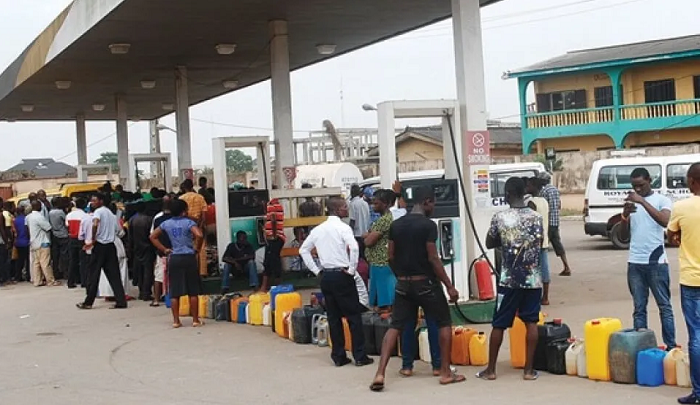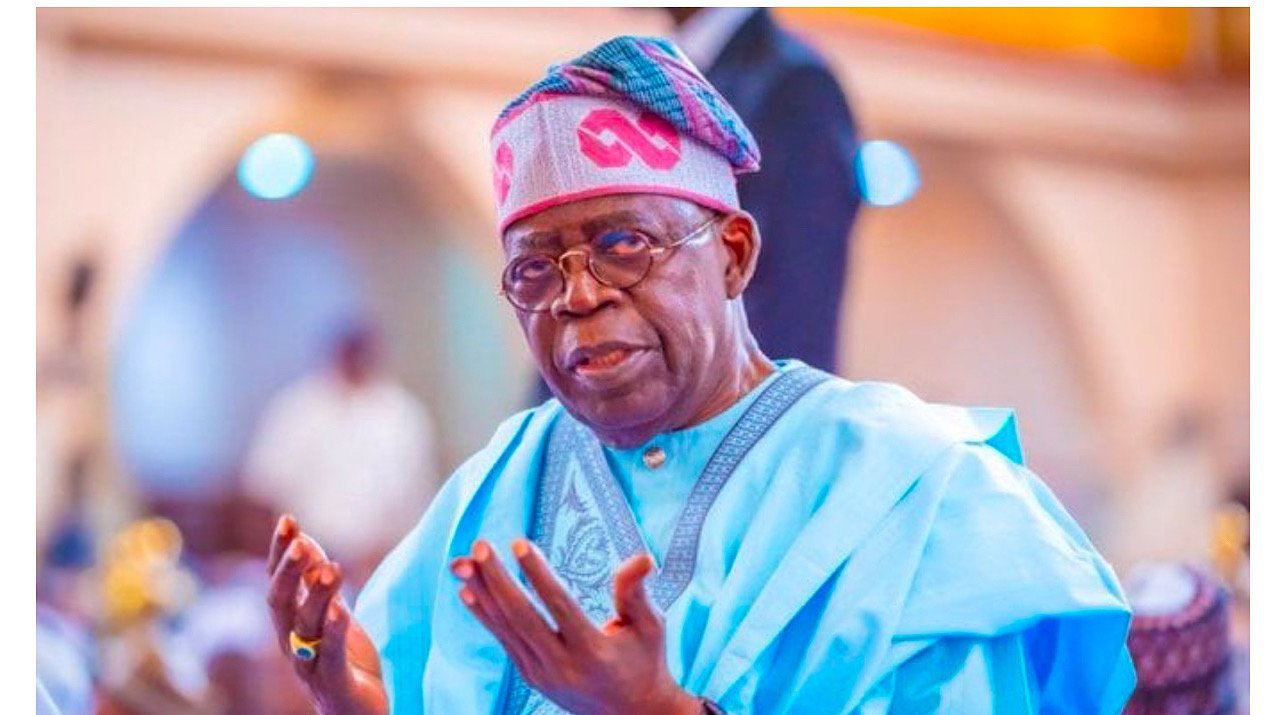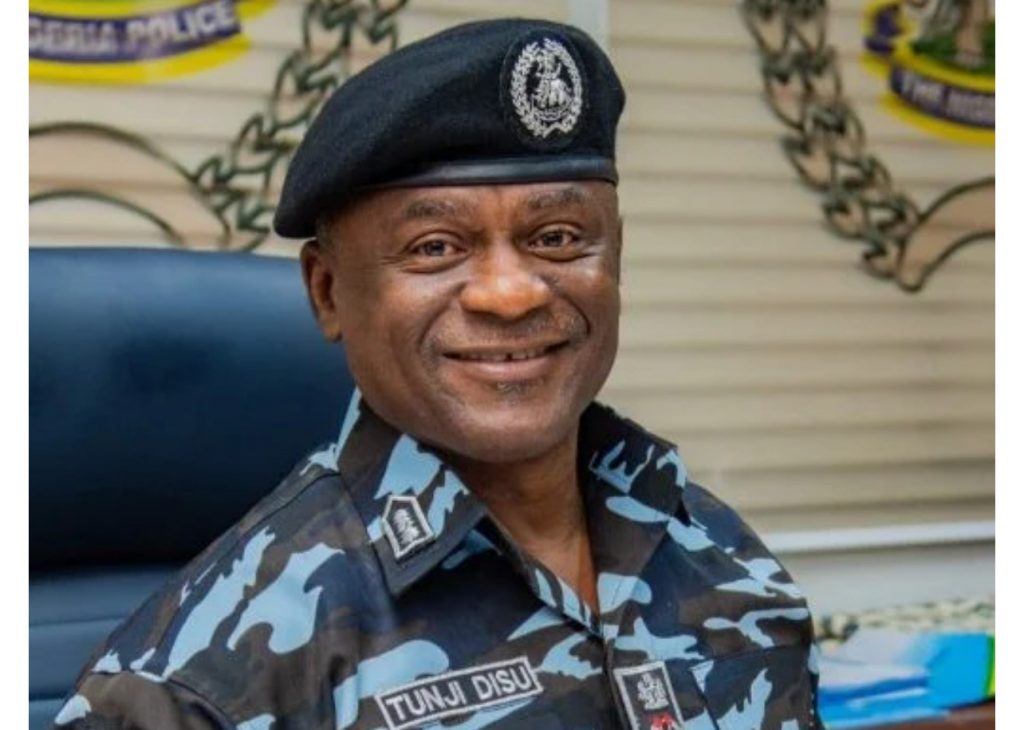news
Update: Energy crisis: Petrol scarcity to persist

 ….Petrol subsidy could hit N6trn by end of year, IMF warns
….Petrol subsidy could hit N6trn by end of year, IMF warns
…PENGASSAN cites bridging cost, says high diesel price affecting trucking of petrol by tankers
…Adds sole importation, inadequate funds, others can’t guarantee supply
…As MOMAN canvasses full downstream deregulation, says inadequate supply responsible for scarcity
Indications emerged yesterday that the ongoing fuel scarcity in the country may not abate soon, as major stakeholders in the sector are currently expressing divergent views as to the cause(s) of the crisis.
While the Petroleum and Natural Gas Senior Staff Association of Nigeria, PENGASSAN, said there is sufficient stock of the product to serve the nation for some weeks, which seemed to be the position of the Nigerian National Petroleum Corporation Limited, another major stakeholder, the Major Oil Marketers Association of Nigeria, MOMAN, said the product available is inadequate to serve the nation, noting that the shortage was fueled by fundamental issues and problems in the sector.
PENGASSAN blamed the current scarcity on difference in the bridging gap cost between when the cost of diesel was N250 per litre and now that it had risen to as much as N820.
Speaking at an electronic medium monitored in Lagos yesterday, President of PENGASSAN, Mr. Festus Osifo, said: “Nigerian Midstream and Downstream Petroleum Regulatory Authority, NMDPRA and truck drivers are the ones administering the bridging fund.
“At a particular time, they agreed with truck drivers that the bridging fund is going to be about N10 per litre, depending on the destination you are going to all over the country.
“As at when they agreed, the cost of diesel was about N250, so it was fashionable and the N10 was okay, but today, the cost of diesel is over N700. It has tripled.
“So, the expectations from the tanker drivers is that since the cost has gone up, instead of paying N10.40 kobo as the case may be, you have to multiply it by three. This is a major problem. As at today, we have close to two billion litres of PMS, so the problem is not the stock.’’
He explained that while the stock is available, most truck drivers are not willing to move these products, “because of the previous problem I just enumerated.
“One of the issues again is that today, NNPC is the sole importer of PMS, so they import PMS into the country, and this PMS is brought to the high sea, so they rent some smaller vessels to bunker the PMS and take to the various tank farms or depots.
“So, if it’s the NNPC depots and you are loading from the NNPC depots, you are going to pay about N148 as the ex-depot price. But some of the PMS are also stored in private depots and those private depots don’t sell to retailers for N148; they add some premium to it. At the end of the day, they sell between N152, N155, N160 and N162.”
Inadequate supply, other challenges abound — MOMAN
Countering this at a virtual meeting monitored yesterday in Lagos, the Chairman of MOMAN, Mr. Olumide Adeosun and the Chief Executive Officer, MOMAN, Mr. Clement Isong, jointly observed that the current scarcity of petrol was occasioned by supply inadequacy in the last few weeks, which was worsened by the scarcity and rising price of Automotive Gas Oil (diesel), which tanker drivers depend on to move petrol from the depots to the filling stations.
They said: “MOMAN, as an association, fears that the current supply framework cannot guarantee steady and consistent supplies to the country, given the current state of government finances and unpredictable international supply shortages.”
Full downstream deregulation is key
The duo, who canvassed deregulation, said: “We recommend a gradual price deregulation with targeted palliatives (e.g. transport and agricultural subsidies) to the public to ease implementation.
“However, in the interim, MOMAN recommends that the current single supplier strategy be reviewed. The Federal Ministry of Petroleum Resources, in collaboration with the Ministry of Finance and other relevant MDAs, should set up a task force to immediately focus on increasing diesel supply through accelerated initiatives to increase local modular refining capacity. This move will tackle the supply and distribution challenges.
“There should be phased rehabilitation of existing NNPC refineries to hasten supply of middle distillates (AGO & ATK). MOMAN recognizes and closely associates with the need to ease challenges, with respect to high energy and transportation costs occasioned by extraneous circumstances.
“MOMAN shall continually do its best to distribute petrol to its customers across the country and keep exploring opportunities to partner with industry stakeholders, The Authority and the government should ensure the sustainability and institutionalization of a viable petroleum downstream sector in Nigeria.
“The full deregulation of the petroleum downstream sector and full implementation of the Petroleum Industry Act (PIA) 2021 clearly remains the most viable long-term solution to the country’s supply and distribution challenges.”
Ukraine-Russian war factor
In any case, an investigation by Vanguard indicated that the outbreak of the Ukraine – Russian war and ban on Russian oil and gas, have culminated in scarcity and rising prices globally.
Consequently, Nigeria remains one of the most affected nations because of its over-dependence on imported petroleum products at the expense of the nation’s scarce foreign exchange, thus over-stretching the capacity of government to import.
Legislators postpone dialogue with stakeholders
Meanwhile, the House of Representatives yesterday postponed its meeting with the major stakeholders in the downstream sector from yesterday to Friday this week, following the taking of permission and absent of major stakeholders.
However, the meeting was targeted at finding lasting solution to the nation’s prolonged energy crisis.
Specifically, those expected at the public hearing include the Nigerian National Petroleum Corporation (NNPC) Company limited represented by the GMD, Mr. Mele Kyari, the Minister of State for Petroleum, Timipre Sylva, the Chief Executive Officer of the NMDPRA, the Managing Director of the Nigerian Gas Company (NGC) and that of the Nigerian Gas Marketing Company (NGMC), two subsidiaries of NNPC Limited and others.
The lawmakers had in a letter signed by the Chairman of the Joint Committee on Petroleum Resources (Downstream) Hon. Mahmud Gaya, invited the heads of the organisations for the hearing.
But addressing the House, the Chairman of the joint committee, Gaya said he received communication from the GMD and the minister who said they would not be able to make it because they were also in another meeting at the time.
Long fuel queues, other woes remain
However, the queues remained visible at many filling stations across the nation, yesterday, due to lack of adequate supply.
Transporters, who managed to get supply at the prevailing black market price, ranging from N200 to N300, increased fares to cover cost.
This, it was gathered, has already culminated in the general increase in the prices of basic services and goods, including commodities, a development worsened by epileptic power supply and high prices of cooking gas as well as aviation fuel.
news
Update : Seyi Tinubu Responds to King Mitchy, VeryDarkMan Saga


Seyi Tinubu, son of President Bola Tinubu, has issued a statement debunking allegations linking him to a feud between social media personalities Martins Vincent Otse, popularly called VeryDarkMan, and Mitchell Mukoro, widely known as King Mitchy.
The controversy stems from claims suggesting an improper relationship or secret arrangements between Seyi Tinubu and King Mitchy, which VeryDarkMan has reportedly used to intensify his online narrative.
Our correspondence reports that philanthropist and content creator King Mitchy recently announced that she renovated a dilapidated school in six days, suggesting that the project was proof that meaningful change could happen swiftly when there was genuine intent.
However, she reportedly made comments widely interpreted as subtle jabs at VeryDarkMan, who, in turn, accused her of being used as a political pawn to launder the image of President Bola Tinubu’s administration.
Tagging the President’s son. VeryDarkMan was said to have alleged in another video that both Seyi Tinubu and King Mitchy were threatening his life.
Addressing the comments in a statement shared on Instagram on Saturday, Seyi Tinubu categorised the allegations and insinuations as false.
He clarified the nature of his interaction with King Mitchy, framing it strictly within the bounds of his long-standing philanthropic work.
Tinubu wrote, “I met Mitchy once, in a public setting, alongside others. On that occasion, I provided financial support toward her NGO activities, just as I have supported many young Nigerians and organisations working to empower our people.
“A follow-up meeting had been scheduled for me to receive an update on the impact of her NGO’s work following the donation. That meeting did not take place because I have been unwell.”
He categorically denied any private encounters, saying, “There has never been a private encounter, no secret arrangement, and no impropriety of any kind.”
Tinubu took direct aim at VeryDarkMan, accusing the activist of using a feud he had no part in to attack his reputation.
He wrote, “What is deeply concerning is that a feud I did not start, and in which I have played no part, has been used as a vehicle to insert my name into a narrative without basis in truth.
“For reasons best known to him, VDM appears to have been looking for a trigger, an opportunity to attack and attempt to harm my reputation and seized upon this situation to do so. I will not accept that.
“If my name generates attention, let us at least deal in facts. Supporting charitable causes is not a crime. Meeting someone publicly to support their NGO is not a scandal. Repeating falsehoods loudly does not transform them into truth.”
Tinubu asserted that he won’t be intimidated by “fictional” narratives, emphasising that he refuses to be bullied.
“I will not be bullied, and I will not dignify fiction with panic.
“I have experienced bullying before, and I understand the harm it can cause. That is why I take a firm stance against it,” he said.
Tinubu concluded by reaffirming his commitment to serving Nigerian youth through his foundation, insisting that “philanthropy and outreach must never be politicised or weaponised.”
“To those seeking to manufacture controversy: Nigeria needs builders, not bullies. We need responsible discourse, not sensationalism driven by speculation.
“I firmly reject the accusations made against me. I call for de-escalation, for restraint, and for a return to truth and responsibility,” he added.
news
Security Reform: Tinubu Calls for Urgent Constitutional Backing for State Police


…raises fresh alarm over terrorism, banditry at State House Iftar
…Akpabio pledges more support, vows no executive bill will die in Senate
President Bola Ahmed Tinubu on Wednesday night formally urged the Senate to begin the process of amending the 1999 Constitution to provide for the establishment of state police, declaring that Nigeria must urgently restructure its security architecture to confront terrorism, banditry and insurgency.
Speaking at an interfaith breaking of fast with the leadership and members of the Senate at the State House, Abuja, the President said the time had come for lawmakers to “start thinking” about embedding state policing in the Constitution to enable governments at subnational levels better secure their territories.
“Nigeria is extremely challenged, we are facing terrorism, banditry, insurgency, but you never failed to make a right response to these calls. What I will ask for tonight is for you to start thinking how best to amend the Constitution to incorporate the state police for us to secure our country, take over our forests from marauders, free our children from fear”, Tinubu said.
The President’s latest appeal adds momentum to a campaign he has sustained since early in his administration.
In February 2024, during an emergency meeting with the 36 state governors at the State House, Tinubu approved the creation of a joint committee of federal and state representatives to explore modalities for establishing state police, insisting that the country must “move aggressively” to improve security of lives and property.
He renewed the call in November 2025, urging the National Assembly to begin reviewing relevant laws to allow states willing to establish their own policing structures to do so.
At the APC National Caucus meeting in December 2025, he again pressed governors and lawmakers to back constitutional reforms for state police and local government autonomy.
Only days ago, at an interfaith breaking of fast with governors at the Presidential Villa, the President declared that state police “can’t wait” and “will not be postponed,” urging preparations for what he described as a necessary shift in the nation’s security architecture.
At Wednesday’s gathering with senators, Tinubu framed the proposed reform as a constitutional obligation anchored on unity and shared responsibility.
“What you have faced in the challenging period of this country, the terrorism and banditry, is causing us havoc and we should pull together, unite in a way that our forefathers contemplated to bring about a constitutional democracy and pull us together. They didn’t say we should fight,” he said.
Beyond security, the President expressed deep appreciation to lawmakers for supporting what he described as bold and necessary economic reforms.
“I have a lot of credit for bold reforms. Without your collaborations, without your inspirations, those reforms are not possible. We are reformists together,” he said.
Tinubu defended the removal of petrol subsidy and foreign exchange reforms, describing them as steps taken to halt “monumental corruption.”
“What we gave up and what we stopped is a monumental corruption in subsidy. We gave it up. We don’t want to participate in monumental corruption, in arbitrage, foreign exchange,” he stated.
‘Amend Constitution to accommodate state police’
State police and questions Nigeria can no longer avoid
Senate backs state police, technology-driven reforms to boost Nigeria’s security
According to him, the reforms have laid the foundation for economic stability.
“You don’t have to chase me for dollars. In the past, you could see what Nigeria is today. You should be proud… What we are enjoying is stable economy, prosperity beckoning on us. We just need to work hard for it,” he added.
Responding to criticisms from political opponents, the President dismissed claims that he was stifling opposition voices.
“When they accused me of killing oppositions, I didn’t have a gun… I can’t blame anybody from jumping out of a sinking ship if they did,” he said, in apparent reference to recent defections.
He described the coincidence of Ramadan and Lent as symbolic of national unity and called for continued harmony between the executive and legislature.
“We are committed to Nigerian entity succeeding. We are committed to make law for the welfare, prosperity of the country. I think we are committed together to govern together,” he said.
In his response, President of the Senate, Senator Godswill Akpabio, assured the President of the chamber’s loyalty and continued cooperation.
“We have nothing to give to you than to assure you of our loyalty,” Akpabio said. “I’m sure you have noticed that nothing you have ever sent to us died in first reading, and it will never happen.”
He said the Senate painstakingly reviews executive proposals to ensure they serve national interest, even when they initially attract criticism.
“We sit down to painstakingly go through everything that comes before us, and then at the end, we see that it is in the interest of Nigerians, even when the social media is not seeing it,” he said.
Akpabio commended Tinubu’s tax reforms, foreign exchange unification, fuel subsidy removal and the recent electoral amendment, noting that the President promptly assented to the revised Electoral Act when convinced it served national interest.
He expressed optimism that by 2031, Nigeria would be more prosperous under Tinubu’s leadership and offered prayers for peace amid what he described as “troubles and sponsored insecurity” in parts of the country.
The Senate President also thanked Tinubu for appointing former Senator Jimoh Ibrahim as an ambassador, describing it as recognition of legislative talent.
The interfaith gathering ended with prayers for unity, wisdom and strength for the nation’s leaders as they navigate security and economic challenges.
news
BREAKING: Tinubu Names Tunji Disu Acting Inspector General After Egbetokun’s Exit


President Bola Tinubu has accepted the resignation of the Inspector-General of Police, Kayode Egbetokun, and approved the appointment of Tunji Disu as Acting Inspector-General of Police with immediate effect.
Our correspondent had earlier reported that Egbetokun tendered his resignation letter on Tuesday, citing pressing family considerations.
Appointed in June 2023, Egbetokun was serving a four-year term scheduled to conclude in June 2027, in line with the amended provisions of the Police Act.
In a statement issued on Tuesday by his Special Adviser on Information and Strategy, Bayo Onanuga, the President received the letter earlier on Tuesday and expressed appreciation for his service to the nation.
He also commended Egbetokun’s “decades of distinguished service to the Nigeria Police Force and the nation,” acknowledging his “dedication, professionalism, and steadfast commitment to strengthening internal security architecture during his tenure.”
“In view of the current security challenges confronting the nation, and acting in accordance with extant laws and legal guidance, President Tinubu has approved the appointment of Assistant Inspector-General of Police Tunji Disu to serve as Acting Inspector-General of Police with immediate effect.
“The President is confident that AIG Disu’s experience, operational depth, and demonstrated leadership capacity will provide steady and focused direction for the Nigeria Police Force during this critical period,” the statement read.
It added that in compliance with the provisions of the Police Act 2020, the President will soon convene a meeting of the Nigeria Police Council to formally consider Disu’s appointment as substantive Inspector-General of Police, after which his name will be forwarded to the Senate for confirmation.
The President reaffirmed his administration’s commitment to enhancing national security, strengthening institutional capacity, and ensuring that the Nigeria Police Force remains professional, accountable, and fully equipped to discharge its constitutional responsibilities.
-

 news5 years ago
news5 years agoUPDATE: #ENDSARS: CCTV footage of Lekki shootings intact – Says Sanwo – Olu
-

 lifestyle6 years ago
lifestyle6 years agoFormer Miss World: Mixed reactions trail Agbani Darego’s looks
-

 health5 years ago
health5 years agoChairman Agege LG, Ganiyu Egunjobi Receives Covid-19 Vaccines
-

 lifestyle4 years ago
lifestyle4 years agoObateru: Celebrating a Quintessential PR Man at 60
-

 health6 years ago
health6 years agoUPDATE : Nigeria Records 790 new cases of COVID-19
-

 health6 years ago
health6 years agoBREAKING: Nigeria confirms 663 new cases of COVID-19
-

 entertainment1 year ago
entertainment1 year agoAshny Set for Valentine Special and new Album ‘ Femme Fatale’
-

 news9 months ago
news9 months agoBREAKING: Tinubu swears in new NNPCL Board


